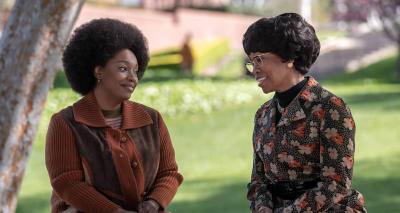Shirley (2024)

Photo by Glen Wilson/Netflix in "Regina King Inspires as Presidential Candidate Shirley Chisholm in a New Biopic."
Movie Info
- Director: John Ridley
- Run Time: 1 hour and 58 minutes
- Rating: PG-13
Visual Parables Content Ratings
- Violence: 1/10
- Language: 2/10
- Sex & Nudity: 1/10
- Star Rating: 4.5 out of 5
Just as Bayard Rustin was a neglected Civil Rights leader until Netflix presented “Rustin,” so has U.S. Congresswoman Shirley Chisholm been relegated to the sidelines since her death in 2005. Netflix again steps up to acquaint us with this ground-breaking Black woman, as does actress Regina King as the film’s subject. Writer-director John Ridley concentrates on the months leading up to the 1972 Democratic Convention.
Ridley does inform us of a little of her background along the way, such as Chisholm being of Guyanese and Bajan descent, and of spending a few years living with her grandmother in Barbados because of her parents’ financial difficulties. Chisholm recalled those childhood years fondly due to her strong-minded grandmother’s encouragement of her independence. She later secured degrees in sociology and elementary education and then worked in childcare centers in Brooklyn, New York, becoming an advocate for early education, of women becoming leaders, and of the working class poor. In 1968 she became the first Black woman to be elected to Congress. (I suspect the obstacles Chisholm faced in the racist 1960s to move from school teaching and participating in state politics up to the national level of Congress itself could make for a two-hour movie!)
Ridley begins his film shortly after Chisholm was elected to Congress. She was disappointed that the Speaker of the House had appointed her to the House Agriculture Committee and wants to speak with him about it. A Black Brooklynite serving on a committee dedicated to the interests of Mid-Western farmers?! You can’t be serious! Her advisors tried to talk her out of such an unprecedented move for a freshman in Congress, but she spoke with him anyway. When he chastised her audacity, she punched back. Without saying so, the film jumps ahead in time, implying that she won a more appropriate assignment. However, a quick check in Wikipedia reveals something better, and which should have been included in the film. Somehow she had looked to a world-famous Jewish scholar Rebbe Menachem M. Schneerson who, in effect, advised her to take advantage of her membership on the committee that oversaw the huge crop surplus of the government programs and channel that food to the hungry poor – a good example of making lemonade from lemons. Thus, she was important in the creation of the Special Supplemental Nutrition Program for Women, Infants and Children (WIC).
Jump to 1972 when she decides to run for president. She believed that politics had been taken from the people. Speaking on behalf of the downtrodden, she said she wanted to give it back to them. Her family and friends are anything but enthusiastic, but she persevered and formed a team consisting of her husband, Conrad (Michael Cherrie), whom she put in charge of her security detail; mentor/advisor Wesley McDonald “Mac” Holder (Lance Reddick); advisor/fundraiser Arthur Hardwick (Terrence Howard); and Barbara Lee (Christina Jackson). The latter is a young woman so skeptical that she saw no point in participating in a corrupted political system – until Chisholm convinced her otherwise. The one white member of her campaign team was law student Robert Gottlieb (Lucas Hedges), whom she tasked with reaching out to the newly enfranchised college students.
The fight is uphill, with a continual lack of funds and shifting alliances with other politicians who did not keep their word to her. Some of the real-life politicians were Walter Fauntroy (Andre Holland), Ron Dellums (Dorian Missick), and even Alabama Governor George Wallace (W. Earl Brown). I especially appreciated the brief scene in which Chisholm visited the latter following the assassination attempt that left him paralyzed from the waist down for the rest of his life. Her friendly gesture of forgiveness highlights her devout Christian faith, though it was widely misunderstood by her supporters as selling out to the enemy. Also included is Chisholm’s meeting with Black Panther leader Huey Newton (Brad James), arranged by mutual friend, actress Diahann Carroll (Amirah Vann).
Shirley Chisholm’s campaign fell short of her aspiration, with Senator McGovern eventually winning the nomination despite all the maneuverings of his opponents, but she paved the way for both women and Blacks to enter national politics. During her seven terms in Congress, from 1969 to 1983, she was a champion for economic justice and racial equality. Her former campaign aide, Barbara Lee, has served as a U.S. representative from California since 1998, and campaign youth coordinator Robert Gottlieb (Lucas Hedges) went on to become a successful lawyer.
Although criticized because the film does not deal much with her personal life, there are scenes of the clashes between Shirley and husband Conrad. We can understand how he must have felt pushed into the background, especially when she insisted on dipping into their own money for her campaign, and when she scolded him for failing to protect her when a gunman tried to shoot her. As we learn in the endnotes, the two eventually divorced. More upbeat is the conclusion of the rift with her sister Muriel St. Hill (Regina King), who, until the end, had refused to support her in any way.
We might wish for more personal detail, but Regina King so artfully conveys the Congresswoman’s strong personality and compassion for others that I am grateful for John Ridley’s script and direction. It is a worthy addition to the masterwork “12 Years a Slave,” the script for which he wrote and executive produced.
